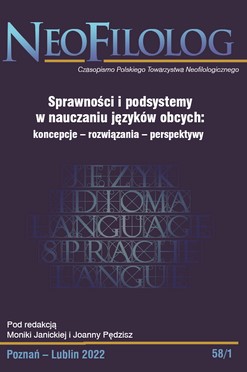Paradygmat afektywno-kognitywny w badaniach procesu uczenia się i nauczania języków obcych w kontekście komunikacji specjalistycznej
The Affective-Cognitive Paradigm in the Study of Foreign Language Learning and Teaching in the context of Specialist Communication
Author(s): Mariola JaworskaSubject(s): Foreign languages learning, Language acquisition, Cognitive linguistics, Cognitive Psychology, Pedagogy
Published by: Uniwersytet Adama Mickiewicza
Keywords: affective-cognitive paradigm; affective processes; cognitive processes; foreign language learning and teaching; specialist communication; individual differences;
Summary/Abstract: Academic discourse has in recent years emphasised the importance of an integrative approach to foreign language learning and teaching in which affective factors are treated equally to cognitive ones. These components are characterised by dynamic interaction where emotions are not viewed as an addition but as an important component of the language learning process that act as a catalyst. The aim of this article is to review theoretical approaches based on the assumption that affective and cognitive processes cannot be perceived as two separate areas of the human psyche, as both jointly shape human actions, including those in language. This view is the starting point of an analysis of the potential use of the affective-cognitive paradigm in preparing for specialist communication. It is assumed that it can become a theoretical framework for empirical research that will allow for a better understanding of the specificity and functioning of individual differences in language communication and allow for a more complete picture of specific factors, taking into account their multidimensional nature, dynamics and embeddedness in the context of specialist communication.
Journal: Neofilolog
- Issue Year: 58/2022
- Issue No: 1
- Page Range: 27-41
- Page Count: 15
- Language: Polish

